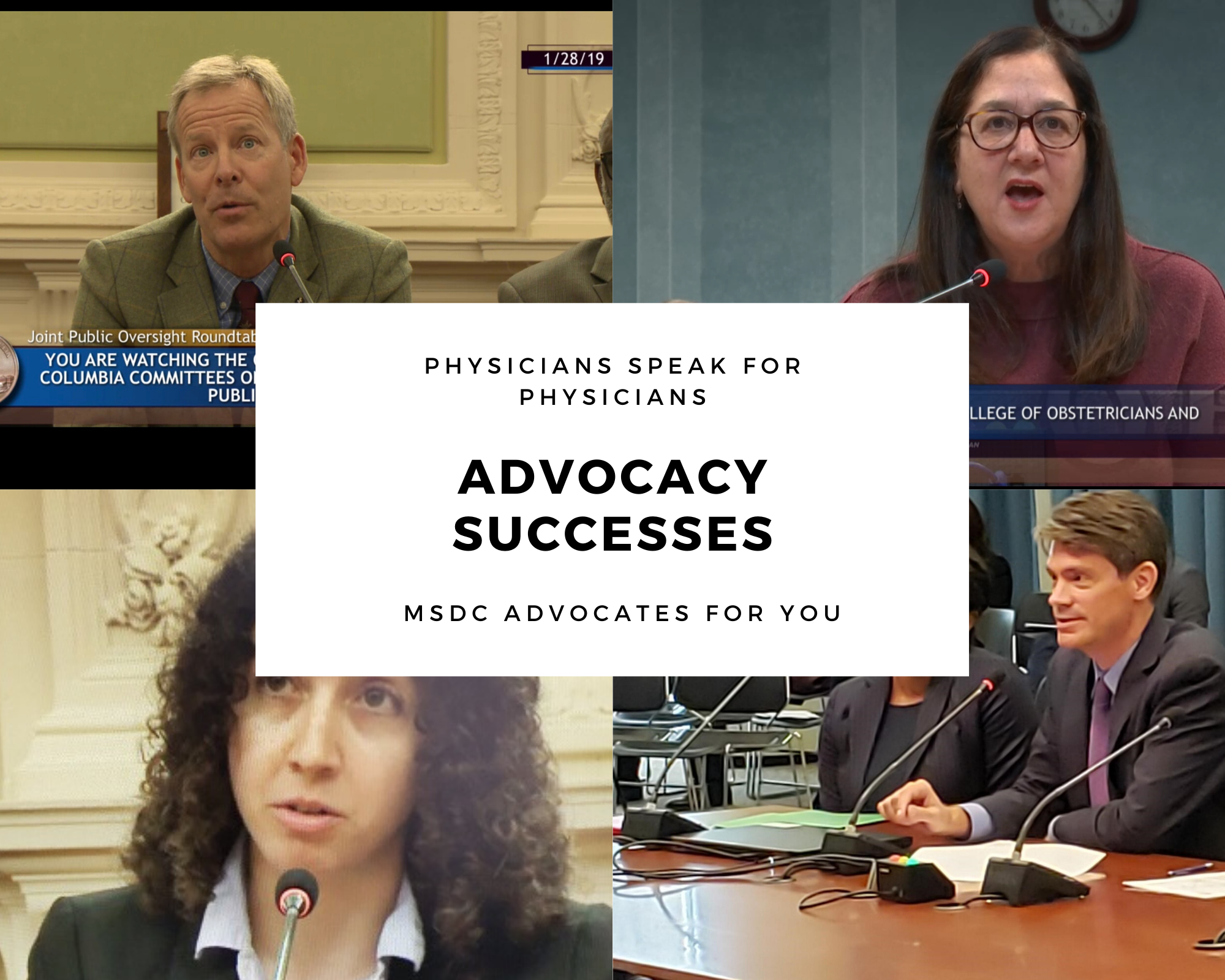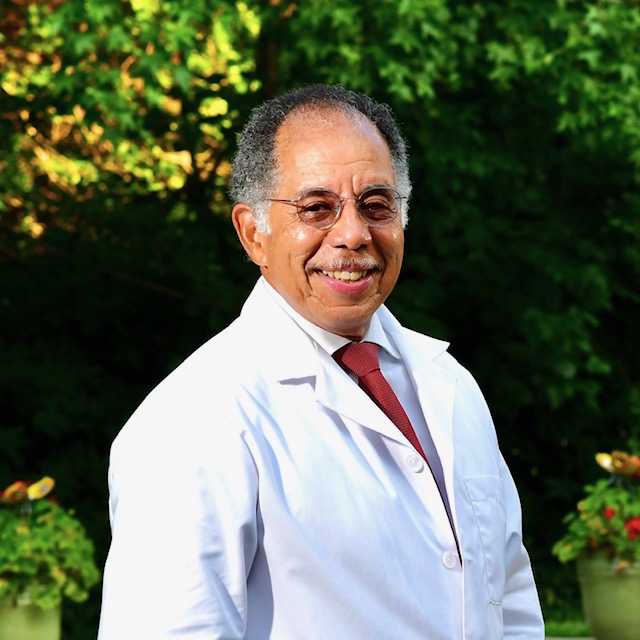Advocacy Successes

Physician Advocacy Successes
Good health policy is made with physicians in the discussion.
MSDC, working with its members, partners, and other organizations, has won major policy victories to help its members practice medicine. Below is a sampling of those victories. Do you want to be a vital part of the next policy victory helping improve the health of the District? Contact us today.
Opioid Policy
- MSDC was added to the opioid fund oversight panel by the Council in its legislation authorizing the oversight body
Scope of Practice
- MSDC supported legislation to ban the sale of flavored electronic smoking devices and restrict the sale of electronic smoking devices.
- Working with a coalition, MSDC added funding to the DC budget to support the hiring of more license specialists to help with the delay in processing medical licenses.
Women's Health
- B24-143, to regulate certified midwives, passed the Council with MSDC's support
Health Equity
- Mayor Muriel Bowser signs into law the Electronic Medical Order for Scope of Treatment Registry Amendment Act of 2019. The eMOST Registry Amendment Act permits the creation of an electronic database of advanced directive wishes for District residents that can be tied into the health information exchange.
- Mayor Bowser signs into law the School Sunscreen Safety Temporary Amendment Act of 2019. The bill permits students to bring and apply sunscreen during the 2019-2020 school year.
- MSDC comments on the importance of funding United Medical Center (UMC) and health facilities in Wards 7 and 8 in the mayor's budget. Those comments are used almost verbatim in CM Trayon White's comments advocating for funding of United Medical Center.
Scope of Practice
- DC Health publishes draft regulations removing the 3 mandatory CME hours for HIV/AIDS awareness and replaces them with a requirement to fulfill 10% of mandatory CME hours with a topic from a public health priority list. DC Health then waived the requirement for 2020.
- The Strengthening Reproductive Health Protections Act of 2020 is signed into law with MSDC support. The bill prohibits government interference in reproductive decisions between a patient and doctor, and prohibits employers from penalizing physicians for practicing reproductive medicine outside of their work hours.
- The Mayor's Commission on Healthcare Systems Transformation releases its final recommendations. One recommendation is for the District to explore options to make providing health care more affordable, including financial relief for higher malpractice insurance rates.
- The Council removes "telephone" from the list of prohibited types of telemedicine to allow physicians and other providers to be reimbursed for telephone telemedicine appointments after MSDC and health community advocacy.
- MSDC worked with the Council to modify onerous language in the Health Care Reporting Amendment Act that potentially would have penalized physicians from seeking help for substance abuse or addiction issues.
Opioid/Drug Policy
- The Department of Health Care Finance (DHCF) waives prior authorization for key medication assisted treatments (MAT) treating substance use disorder patients in Medicaid.
- The Mayor signed into law The Access to Biosimilars Amendment Act of 2019, a top MSDC priority as it would help prescribers to prescribe more cost-effective drugs for patients.
Behavioral Health
- The Behavioral Health Parity Act of 2017, a major priority for MSDC and DCPA, officially becomes law. The legislation requires all health benefit plans offered by an insurance carrier to meet the federal requirements of the Wellstone/Domenici Mental Health Parity and Addiction Equity Act of 2008.
Health Equity
- The District Council passes B22-1001, The Health Insurance Marketplace Improvement Amendment Act of 2018. The bill prohibits the sale of Short Term, Limited Duration health plans and Association Health Plans (AHPs) in the DC Health Benefits Exchange.
Scope of Practice
- DC joins 28 other states in the Interstate Medical Licensure Compact with B22-177 becoming law. The IMLC is designed to ease physician licensure in multiple states.
Women's Health
- The Maternal Mortality Review Committee is established by law. The Committee is responsible for finding solutions to maternal health crisis in the District. District physicians are an important part of this vital committee.
- B22-106, The Defending Access to Women's Health Care Services Amendment Act, becomes law. The act requires insurers to cover health care services like breast cancer screening and STI screenings without cost-sharing.
Opioid Policy
- Right before the Council adjourned for the session, it passed B21-32, the Specialty Drug Copayment Limitation Act. The bill limits cost shifting by payers for prescription drugs.
Behavioral Health
- B21-0007 passes the Council. The Behavioral Health Coordination of Care Amendment Act of 2016 permitted the disclosing of mental health information between a mental health facility and the health professional caring for the patient.
Women's Health
- MSDC was proud to have worked on B21-20. The law requires payers to cover up to 12 months of prescription contraception, advancing women's health and equality.
Dr. Edwin Chapman: Child of Determined People

For those with insurance, Dr. Chapman has observed some success; however, working to improve insurance coverage for social services and peer support services is another obstacle Dr. Chapman is willing to take on. “We need to change the payment system so that payment is provided for these essential support services as a part of the medical setting including social workers and people with lived experiences: advocacy, housing, transportation, employment, as well as an empathic ear. Social Determinants of Health are just as important as state-of-the-art medications.”
To maintain his own health and wellbeing to tackle such daunting obstacles, Dr. Chapman enjoys his personal time. “Medicine is my passion, but I recognize the need to maintain my own mental health. That means spending time watching sporting events, concerts, plays, movies, and a good meal with family and friends.”

Leave a comment